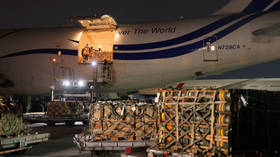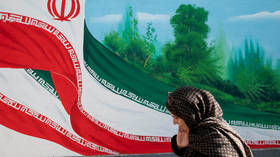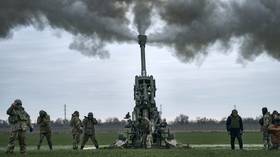Armenia, Turkey still at odds a century after 1915 massacre
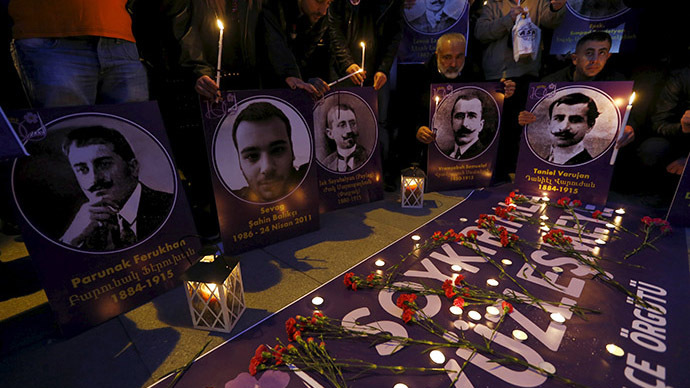
As Armenians mark 100 years since over a million of their countrymen and women were slaughtered by the Ottoman Turks, Yerevan and Ankara are still unable to find common ground on the sensitive issue and begin diplomatic relations.
FOLLOW RT's LIVE UPDATES on Armenia marking 100 years since 1915 massacre
Some 2 million Armenians were living in the Ottoman Empire at the
start of the World War I in 1914, which increased turmoil in the
Middle Eastern realm and led to its eventual demise.
In the next eight years, the size of the Armenian population in
Turkey decreased to less than half a million.
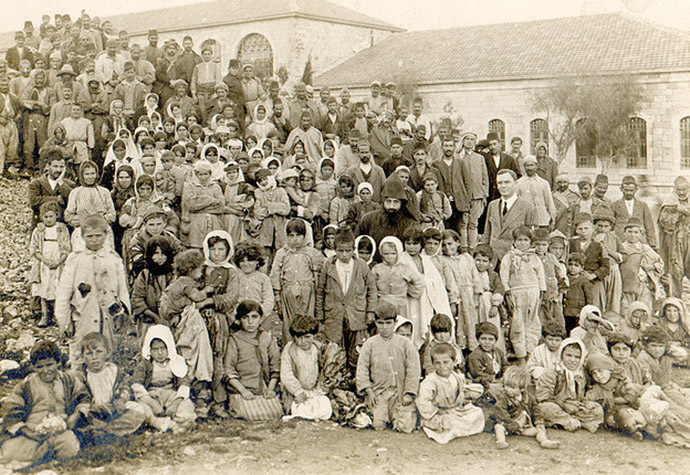
The mass killings, which historians believe led to the demise of
over 1.5 million people, began on April 24, 1915, when 250
Armenian intellectuals and community leaders were detained by the
authorities and later executed in the then-capital,
Constantinople (now Istanbul).
The violence was committed under the rule of the Young Turks
movement, later known as the Committee of Union and Progress
(CUP), which led the rebellion against the absolute movement, but
at the same time shifted towards policies of Turkish nationalism.
Under the centralized CUP government, able-bodied Armenian men
were ordered to be slaughtered in thousands or subjected to
military service and exhausting labor. Women, elderly and
children were relocated to the Syrian Desert, with rape and
murder by the escorting Ottoman troops commonplace during the
marches.
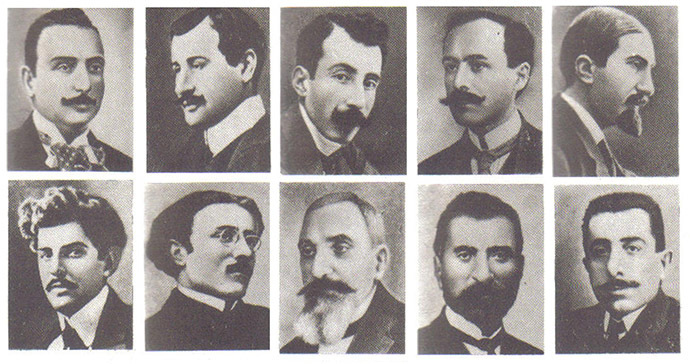
The Armenians were already resented by many Turks for their
success in business activities and for their Orthodox Christian
faith. However, there were also fears that Armenians would
support the advancing Russian troops instead of the Ottoman
Empire in wartime.
The reprisals and deportations resulted in a massive exodus of
Armenians, who fled and formed diaspora communities around the
globe.
The Armenians refer to the killings as Medz Yeghern, or the Great
Crime, and demand the mass human rights violations of the Ottoman
Empire be recognized as genocide by the international community.
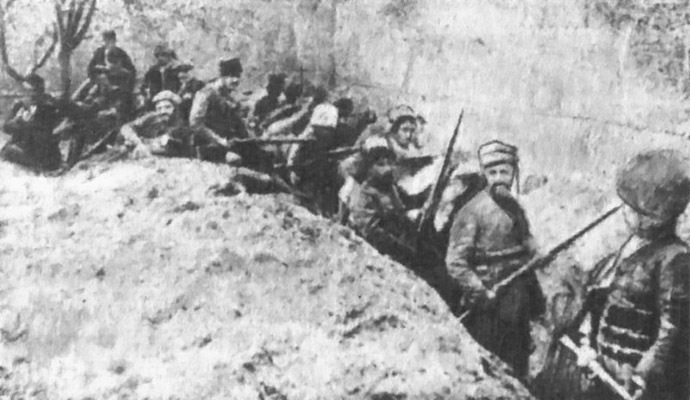
“We want the modern Turkish authorities to shed the burden of the actions of the Ottoman Empire,” Armenian President Serzh Sargsyan told RT on Thursday. “The modern authorities did not commit the genocide, but when they try to justify it, they take responsibility for it.”
Turkey – the successor to the Ottoman Empire – has refused to
accept the label. Ankara says the deaths were a tragic
consequence of war and that the Armenians were not specifically
targeted because of their ethnic background.
Moreover, by acknowledging crimes against humanity, Ankara could
become liable to reparations, which some Armenian human rights
groups estimate in the trillions of dollars.
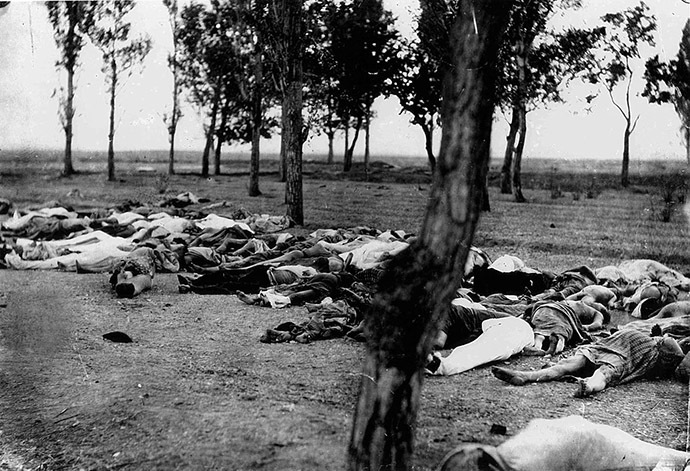
It would also be a blow to Turkey’s international reputation as
the word ‘genocide’ firmly associates with the Holocaust, the
killing of six million Jews by the Nazis during World War II.
Ankara’s stance on the issue has become somewhat more flexible in
recent years, with Turkish leader Recep Tayyip Erdogan offering
his condolences to Armenia over the “inhumane” mass
murders.
However, on April 25, Turkey will be commemorating 100 years
since the Gallipoli Landings, which was the Ottoman Empire’s
greatest World War I success, in which its military repelled the
Allied Forces’ attack on Constantinople.
The announcement angered the Armenian authorities, who took it as
a political stunt to overshadow the anniversary of the Armenian
killings.
In 1997, the International Association of Genocide Scholars
unanimously recognized the Ottoman massacres of Armenians as
genocide.
Turkey has recently become pressured by the international
community to follow the same path.
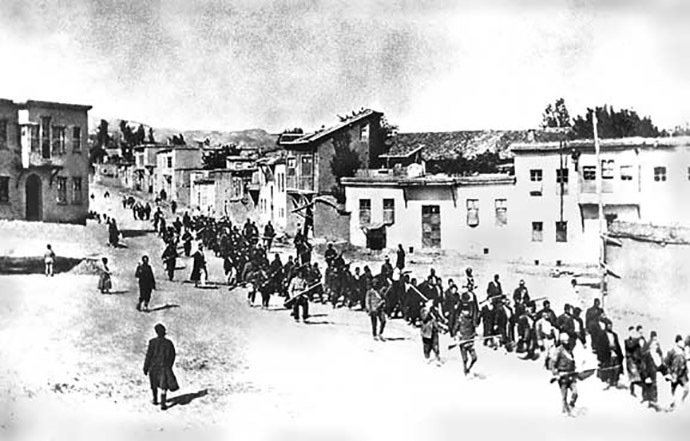
Last week, the European Parliament adopted a resolution urging
Turkey to recognize the Armenian genocide and pave the way for
“a genuine reconciliation” between the two nations,
which would include establishing diplomatic relations and opening
borders.
READ MORE: EU Parliament adopts resolution
calling on Turkey to recognize Armenian
genocide
Ahead of the vote, Erdogan stressed that Ankara would disregard
“whatever decision” the MEPs pass.
Turkey was outraged by Pope Francis’ statement in which the
pontiff honored the 100th anniversary of the slaughter of
Armenians by Ottoman Turks and called it “the first genocide
of the 20th century.”
READ MORE: Turkey in spat with Vatican over Pope's
comments on Armenian genocide
Twenty-four countries, including Canada, France, Italy, Argentina, France, Russia and Syria, have acknowledged that the killings of Armenians by the Ottoman Empire were genocide.
The denial of the Armenian Genocide is officially criminalized in
Switzerland, Cyprus, Slovakia and Greece.
The genocide is also recognized by 43 of the US states, but not
the federal government in Washington.
While still a senator, US President Barack Obama said that
“the Armenian genocide is not an allegation, a personal
opinion or a point of view, but rather a widely-documented fact
supported by an overwhelming body of historical evidence.”
However, Obama never kept his promise to officially recognize the
killing of Armenians as genocide during his two presidential
terms.



